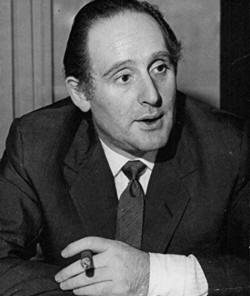

Partner Laurence Harvey
Queer Places:
Eton College, Windsor, Windsor and Maidenhead SL4 6DW
 James Woolf (2 March 1920, London – 30 May 1966, Beverly Hills,
California)[1] and his brother Sir John Woolf (15 March 1913, London – 28 June
1999, London) were British film producers. In 2004, John Fraser published his autobiography,
Close Up, in which he wrote frankly about his gay life and friendships.[7] In
the book, Fraser wrote that actor
Laurence Harvey was gay and that
his long-term lover was his manager James Woolf.
James Woolf (2 March 1920, London – 30 May 1966, Beverly Hills,
California)[1] and his brother Sir John Woolf (15 March 1913, London – 28 June
1999, London) were British film producers. In 2004, John Fraser published his autobiography,
Close Up, in which he wrote frankly about his gay life and friendships.[7] In
the book, Fraser wrote that actor
Laurence Harvey was gay and that
his long-term lover was his manager James Woolf.
John and James founded the production companies Romulus Films and Remus Films, which were active during the 1950s and 1960s,[2] and the distribution company Independent Film Distributors (known as IFD), which was active 1950–59 and handled the UK distribution of films such as The African Queen and Gift Horse, as well as several films made by their two production companies (such as Room at the Top).
John and James Woolf were the sons of the British producer C. M. Woolf (1879–1942), who was co-producer with Michael Balcon of two early Alfred Hitchcock films, Downhill (1927) and Easy Virtue (1928). Woolf senior was a major figure at Gaumont British and established General Film Distributors in 1937. John and James were educated at Eton, while the older brother also attended Institut Montana, Switzerland.[3] John was the sales manager of General Film Distributors until it was taken over by the Rank Organisation[4] James worked for Columbia Pictures in the Hollywood publicity department. John Woolf served in World War II and was demobilised with the rank of major.[5]
When their father died in 1942, J. Arthur Rank became director of General Film Distributors. John returned from the Army as joint managing director. However, neither John or James enjoyed working for a large corporation. In 1948, they went to S.G. Warburg for financial backing for two new companies, Independent Film Distributors, and a production arm, Romulus Films. According to critic Ronald Bergan in his obituary of Sir John Woolf: "Their aims were ambitious: to produce artistically valuable and yet commercially viable films, whose subjects would be wider than the Little Englanderism of British pictures of the period, and featuring big stars."[6] James Woolf's obituary in The Times stated that John "was the main financial brain and James primarily in charge of artistic policy."[7] The first Romulus release was Pandora and the Flying Dutchman (1951) with James Mason and Ava Gardner. The American director-producer Albert Lewin had begun to prepare the film for MGM, but James Woolf discovered on a Hollywood visit that the studio had cancelled the project because of Lewin's problems with the House Un-American Activities Committee. According to John, this resulted in the Woolf's concentration on developing transatlantic projects.[2] Their mentor, Alexander Korda, advised against half-financing The African Queen (1951): "Two old people going up and down an African river . . . who's going to be interested in that? You'll be bankrupt!".[3] Korda was proved wrong. From this John Huston film they gained international critical and financial success. Two further films directed by Huston followed, Moulin Rouge (1952) and Beat the Devil (1953), but were less successful. Romulus became one of the most significant English production companies of the time. They made several films with producer Daniel Angel and helped turn Laurence Harvey, whom they had under contract, into a star. In the mid '50s they formed a partnership with Korda, helping him to finance his films, including Richard III (1955). By 1959, they estimated their movies had earned more than £3million overseas.[8] John Woolf became interested in Room at the Top after seeing an interview conducted by Woodrow Wyatt with the novel's author John Braine on Panorama on 8 April 1957.[9] He bought a copy of the book the next day, and quickly purchased the film rights.[2] Individually, John was instrumental in the formation of Anglia Television in 1958[10] and James wrote novels.[11] In 1963, the Woolf brothers ran into trouble from the film distributors' Defence Organisation owing to their refusal to withhold the rights to their old cinema films from the sale to television. There was some talk that their new films would be boycotted by British cinemas, but that did not happen.[7]
By now the brothers were working separately. James went to Hollywood to produce King Rat. Shortly afterwards he was staying at the Beverly Hills Hotel when he failed to keep a dinner arrangement with director Lewis Gilbert about making a film version of the musical Oliver!. A hotel employee found him dead, sitting up in bed with an open book on his lap; the cause was reported to be a heart attack. He was 46 years old.[12] Bryan Forbes later claimed the heart attack was brought on by an accidental overdose of painkillers.[13] Gilbert had to pull out of the Oliver! project shortly before filming began because of his Paramount contract. John Woolf remembered The Fallen Idol (1948), which suggested to him that its director, Sir Carol Reed, had the requisite skills to work with children.[2]
My published books: